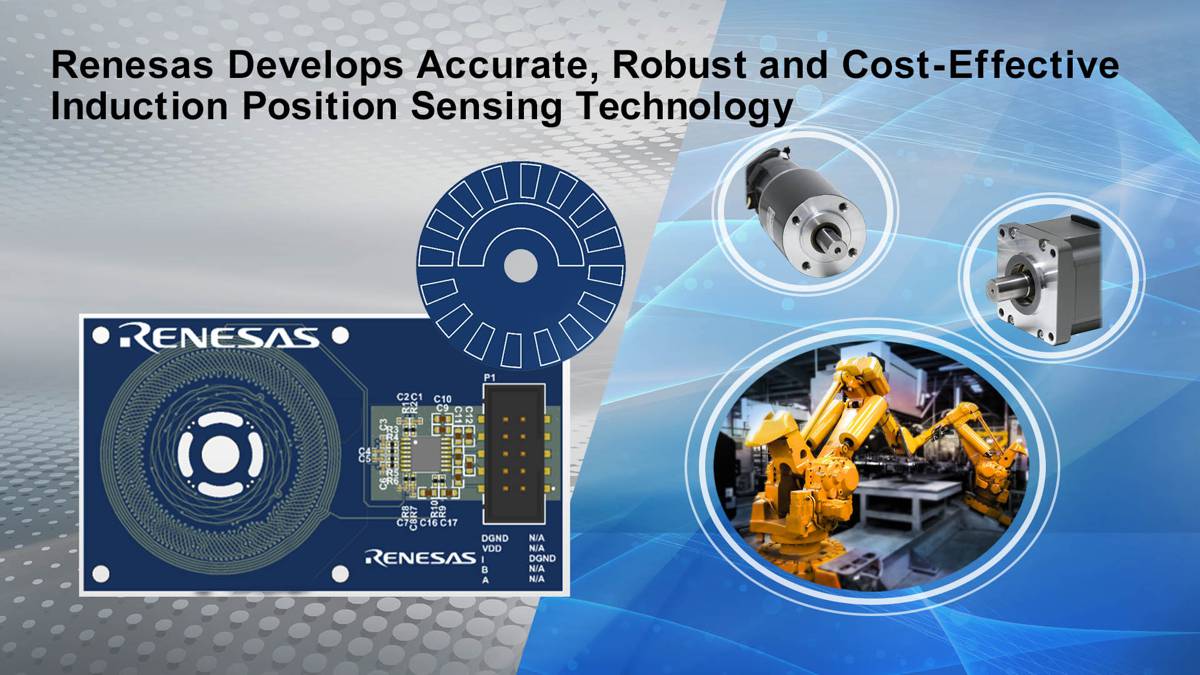Renesas evolves Induction Motor Position Sensing Technology
Renesas Electronics Corporation, a premier supplier of advanced semiconductor solutions, today announced an inductive position sensor (IPS) technology for highly accurate motor position sensor ICs for robotics, industrial and medical applications.
Utilizing non-contact coil sensors, the position sensing technology can replace expensive magnetic and optical encoders now commonly used in motor control systems that require absolute position sensing, high speed, accuracy and reliability.
The proprietary IPS technology from Renesas uses sensing elements consisting of copper coils etched on a printed circuit board (PCB) to detect the position of a metallic target. Unlike heavy magnet-based sensors, the IPS products can operate at 600 Krpm (electrical) and detect the position right at start-up, while the propagation delay is less than 2μs, making them ideal for motors with high rotational speeds. Moreover, the sensor technology supports auto-calibration and linearization features, ensuring consistent performance throughout a motor’s operational life.
Based on the Vernier principle, the dual-coil sensor technology supports a resolution of up to 19 bits and an accuracy of up to 14 bits, which makes them superior to comparable products available in the market. The robust sensor technology will operate reliably in harsh environments, where they can be exposed to high temperatures, dust, moisture, vibration and electromagnetic interference (EMI). The induction sensors are immune to stray fields, require no maintenance, and are less susceptible to error than magnetic sensors. These advantages make induction position sensors a more attractive option than conventional optical encoders or magnetic-based encoders, which tend to be heavier and expensive.
“Our induction position sensor technology represents a significant leap forward in motor position sensors,” said Jan Leuckfeld, Senior Director, HPC Analog (Sensor) Division at Renesas. “They will enable us to provide differentiated motor position sensor ICs for industrial applications that are robust, highly accurate and cost-effective.”
“Position sensors for factory floors must endure extreme conditions such as humidity, high temperatures and vibration,” said Ulrich Marl, Key Account Manager at Lenord+Bauer, a Renesas customer and a leading manufacturer of encoders for industrial systems. “Through our collaboration with Renesas, we’ve integrated IPS-based technology into our encoder portfolio to ensure reliability and safety, while reducing downtime in critical applications.”
The induction position sensor technology will support commonly used UART, ABI and I²C communications interfaces, ensuring a seamless integration into industrial networks and facilitating real-time monitoring and data analysis. Additionally, the new sensor technology will be backed by a complete toolchain that includes dedicated software for user customization and precision optimization.
Renesas plans to combine the new sensor with numerous compatible devices from its portfolio to offer a wide array of Winning Combinations. These Winning Combinations work together seamlessly to bring an optimized, low-risk design for faster time to market.

Key Features
- Rotational speed: 600krpm (electrical)
- Resolution: up to 19 bits
- Accuracy: Up to 14 bits
- Digital interfaces: UART, ABI, I²C
- Extended ambient temperature range: -40 °C to +160 °C
- Two voltage supply ranges: 3.3V ±10% or 5.0V ±10%
- Over-voltage, reverse-polarity and short circuit protection: ±18V on both supply and output pins
- Adaptable to any full-scale angle range through coil design




























